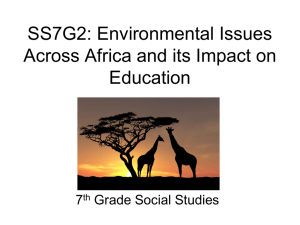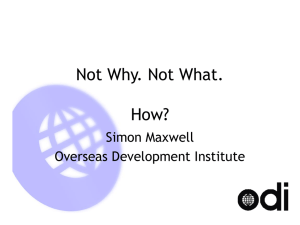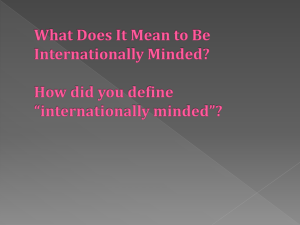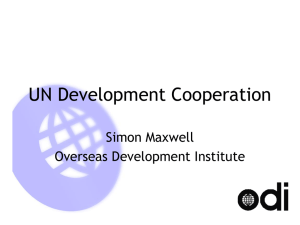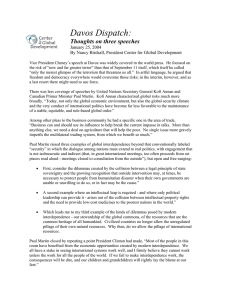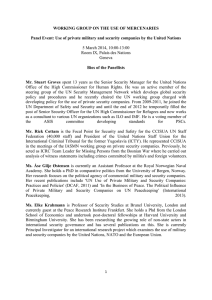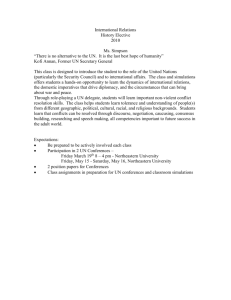Volume 6, Issue 1 January - March, 2013
advertisement
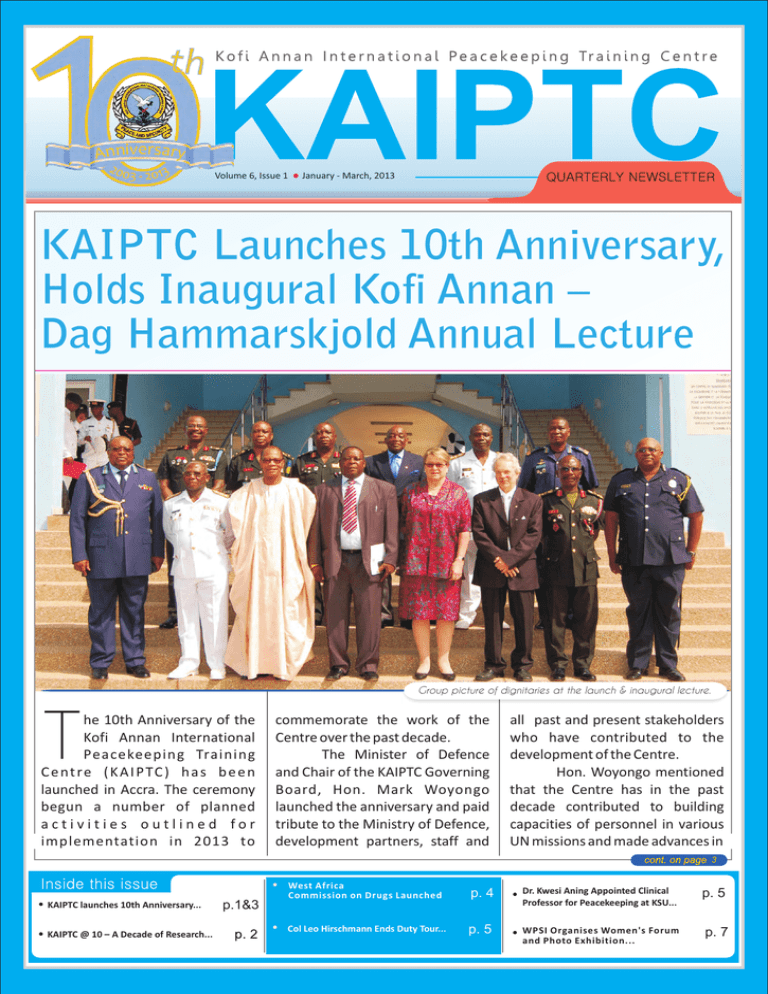
Volume 6, Issue 1 January - March, 2013 KAIPTC Launches 10th Anniversary, Holds Inaugural Kofi Annan – Dag Hammarskjold Annual Lecture Group picture of dignitaries at the launch & inaugural lecture. T he 10th Anniversary of the Kofi Annan International Peacekeeping Training C e n t re ( K A I P TC ) h a s b e e n launched in Accra. The ceremony begun a number of planned activities outlined for implementation in 2013 to commemorate the work of the Centre over the past decade. The Minister of Defence and Chair of the KAIPTC Governing Board, Hon. Mark Woyongo launched the anniversary and paid tribute to the Ministry of Defence, development partners, staff and all past and present stakeholders who have contributed to the development of the Centre. Hon. Woyongo mentioned that the Centre has in the past decade contributed to building capacities of personnel in various UN missions and made advances in 3 KAIPTC launches 10th Anniversary... KAIPTC @ 10 – A Decade of Research... p.1&3 West Africa Commission on Drugs Launched p. 4 Dr. Kwesi Aning Appointed Clinical Professor for Peacekeeping at KSU... p. 5 Col Leo Hirschmann Ends Duty Tour... p. 5 WPSI Organises Women's Forum and Photo Exhibition... p. 7 KAIPTC Quarterly Newsletter Volume 6, Issue 1 January - March, 2013 KAIPTC @ 10 – A Decade of R e s e a r c h , Tr a i n i n g & Education I n May 1998, Ghana's Ministry of Defence approved plans for the establishment of an international peacekeeping training institution. This institution was envisaged to address regional peace and security challenges by equipping men and women with skills needed for managing complex multidimensional peacekeeping activities. Construction of this Centre of Excellence, later named the Kofi Annan International Peacekeeping Training Centre (KAIPTC) started in 2002. A year later, the first course – a Disarmament, Demobilisation and Reintegration (DDR) course – was run for 36 military, police and civilian participants from 32 countries. Ten years on, the KAIPTC has grown to become an internationally preferred Centre of Excellence for research, training and education for conflict prevention, management and resolution. The Centre currently has a fully functional Research section that studies issues related to Security Sector Reform and Governance, Election Related Violence, Small Arms and Light Weapons, Mediation and Negotiations, Protection of Civilians as well as Regional Institutions. The Research section has also done extensive reviews on Emerging Security Threats in West Africa which include Drug Trafficking, Money Laundering and Counter Terrorism. These have significantly driven the design and development of training curricula as well as academic discourse at the KAIPTC. Externally, research done by the KAIPTC have contributed to regional peace and security and informed policies of regional institutions working in the area of peace and security. These institutions include the ECOWAS Commission, the African Union (AU) and the United Nations (UN). As one of few training Centre's spread across Africa to develop capacity in multidimensional peace support operations for regional organisations, the Centre runs courses in Election Observation and Election Management; Disarmament, Demobilisation and Reintegration; Security Sector Reform; Protection of Civilians; Conflict Prevention; Development Diplomacy for Peace and Security among others. The Centre also undertakes police pre-deployment training for West African personnel deployed to UN Missions such as UNAMID and AMISOM. The Centre is currently one of two institutions in the world to run an advanced Course in Disarmament, Demobilisation and Reintegration. Training courses fall into three broad categories, Conflict Prevention, Peace Support Operations and Post Conflict Reconstruction and are run in two languages – English and French. Ten years after the Centre run its first course, the KAIPTC has gone on to train over 9000 military, police and civilian personnel from over 80 countries. In 2010, the KAIPTC chalked a remarkable feat when it was accredited by the National Accreditation Board (NAB), Ghana, to run Post Graduate Programmes in Peace and Security. Currently running two Master of Arts courses in Conflict, Peace and Security (MCPS) 6 KAIPTC Quarterly Newsletter Volume 6, Issue 1 January - March, 2013 KAIPTC Launches 10th Anniversary, Holds Inaugural Kofi Annan – Dag Hammarskjold Annual Lecture critical areas of policy and dialogue in Ghana, the sub-region and on the continent. He indicated that there have been additions to the original mandate of the Centre since it was established and specifically mentioned the introduction of post graduate programmes and the establishment of a Women, Peace and Security Institute (WPSI). Hon Mark Woyongo said the mandate of the KAIPTC feeds into Ghana's policy to contribute to global peace and security and assured the Centre of continued support from the Government of Ghana. Ambassador Ellen Margrethe Løj, former Special Representative of the Secretary-General (SRSG) for UNMIL in Liberia delivered the inaugural lecture after the launch of the 10th Anniversary. She spoke on the topic “Peacebuilding in Africa: Perspectives and C h a l l e n g e s – i n t e r l i n ka g e s b e t w e e n peacekeeping, peacebuilding and state building. Amb. Løj in her delivery admitted that building peace in a post conflict country and building state structures that all citizens can identify with and relate to are daunting tasks. She added that all actors in the peace process, in such instances, must realize this and work together towards the same goal. Ambassador Ellen Margrethe Løj spent four years as SRSG in Liberia and used concrete experiences she faced during her tenure to share experiences in ownership, setting priorities and ensuring sustainability in post conflict situations. She mentioned that the principle of national ownership in post conflict situations is clear but complicated. According to her, real ownership involves a number of critical factors including: (a) an inclusive dialogue among relevant actors; (b) a process of implementation which, as much as possible, is led or directed by national stakeholders; and (c) a process in which national actors commit their own financial resources. With regards to setting priorities in post conflict countries, Ambassador Ellen Margrethe Løj said the process is daunting and needs strong political leadership to ensure an effective approach. She mentioned the need for sequencing priorities or setting “the priorities of the priorities” acknowledging that everything cannot be done at the same time. In ensuing sustainability, Madam Løj said solutions must be homegrown, affordable and representative of the needs of local constituencies. Each approach, she mentioned, is necessary not only to keep the peace but to build peace in the short and long term. Prof Henning Melber, Senior Advisor and Director emeritus of the Dag Hammarskjold Foundation delivered a solidarity message at the lecture. He praised the marriage between the KAIPTC and the Dag Hammarskjold Foundation which has resulted in the co-organisation of an annual lecture on International Peace and Security. The lecture was chaired by Dr. Mohammed Ibn Chambas, Joint AU/UN Representative for Darfur. He welcomed the institution of the Kofi Annan–Dag Hammarskjold Annual Lecture and paid tribute to the former UN Secretary Generals. KAIPTC Quarterly Newsletter Volume 6, Issue 1 January - March, 2013 West Africa Commission on Drugs Launched Former President of Nigeria, Olusegun Obasanjo chairs high level body on growing threat to regional stability ormer United Nations Secretary-General Kofi Annan has unveiled a major new initiative to help tackle the growing threat from illegal drug trafficking in West A f r i c a . T h e We s t A f r i c a Commission on the Impact of Drugs on Governance, Security and Development (WACD) was launched at the Kofi Annan Peacekeeping Training Centre in Accra, Ghana. The Commission was formed in response to the dramatic surge in drug trafficking through West Africa over the past decade. According to the United Nations Office on Drugs and Crime, illegal drug trafficking is linked to criminal and terrorist activities in the region and is fuelling increased local consumption of illegal drugs. F The Commission has been established by the Kofi Annan Foundation, in consultation with international and regional partners, national governments and civil society organizations. It comprises a group of distinguished West Africans, including two former heads of state. Olusegun Obasanjo, former President of Nigeria, who is the chair. The Commission aims to: ? Develop evidence based policy recommendations for political and civil society leaders on how to address drug trafficking ? Mobilise public awareness and political commitment around the issue; and ? Promote local and regional capacities to deal with drug trafficking Kofi Annan said: “The massive surge in drug trafficking in West Africa over the last decade presents a serious and growing threat to the region's stability and development. Left u n c h e c ke d , i l l e ga l d r u g trafficking could compromise the encouraging progress that West African nations have made in strengthening democracy and promoting human and economic development.” Olusegun Obasanjo, said “The trade in illegal drugs has already caused devastation in other regions of the world. We must all work together to prevent West Africa from experiencing the same fate. The Commission looks forward to its urgent and important work”. The Commission will publish a comprehensive report later this year. Mr. Kofi Annan (middle), Ghana's Vice President, HE Amissah-Arthur (third from left) and some of the Commissioners KAIPTC Quarterly Newsletter Volume 6, Issue 1 January - March, 2013 Col Leo Hirschmann Ends Duty Tour C olonel Leo Hirschmann has ended his duty tour to the Centre. He was seconded to the KAIPTC in November 2009 as Director of Training at a time the Centre had adopted a new strategic plan and needed experienced hands to support its implementation. Colonel Hirschmann used his extraordinary sense of initiative, enthusiasm and professional competence to help provide the direction and leadership necessary for the Centre to succeed in its training activities. In his capacity as a Director of the Training Department, Colonel Hirschmann worked with other staff in the Training and Research Departments to review the Centre's training programmes and make recommendations for ensuring they are relevant, up-to-date and meet the changing trends in global peace support training programmes. Key among his achievements were his contributions to the development of a Training Department's Standard Operating Procedures (SOPs), establishment of relationships with the Austrian Armed Forces and strengthening of relations with DPKO (UN), UNITAR and other training institutions, which made it possible for the Centre's Courses to be accorded the necessary international recognition. At a send-off reception held in his honour to officially mark the end of his duty tour, AVM Dovlo, Commandant of the KAIPTC said Col Leo's “varied experiences, abundant energy and high sense of duty stood him out admirably. His skill and versatility as a military officer was never in doubt during his work at the Centre. He has indeed left his mark at Col Hirschmann at a farewell reception held in his honour the Centre as one of the most innovative Departmental Directors.” The send-off reception was also held for Ms. Aissatou Fall, Programme Specialist, WPSI and Ms. Stephanie Schulze, Junior Advisor, GIZ support to KAIPTC. A citation read at the reception commended them for the level of professionalism they displayed through their work at the centre. Dr. Kwesi Aning Appointed Clinical Professor for Peacekeeping at KSU The Kennesaw State University (KSU) has appointed Dr. Kwesi Aning as Clinical Professor for Peacekeeping. The Director of the Faculty of Academic Affairs and Research at the KAIPTC was appointed for “his outstanding record as a statesman and his many years of professional experience as a Professor for Peacekeeping Practice.” “We are excited about how our partnership with KAIPTC has evolved and are delighted to have Dr. Aning join the Kennesaw State University Community,” a statement signed by Dr. Charles Amlaner, Vice President for Research at the KSU said. KAIPTC Quarterly Newsletter Volume 6, Issue 1 January - March, 2013 2 KAIPTC @ 10 – A Decade of Research, Training & Education and Gender, Peace and Security (MGPS), the KAIPTC is one of few training institutions in Africa to run world class tuition in this specialized field. It was no surprise, therefore, that in the latest Global Go To Think Tanks report, the KAIPTC was ranked 60th among the top 70 Global Security and International Affairs Think Tanks. The critical role played by the Centre in its core activities of research, training and education is driven by partnerships which have played a tremendous role in transforming the Centre to become a world-class Centre of Excellence. From the onset when the Government of the Federal Republic of Germany provided an initial 1.8 million Euros for the development of infrastructure, other development partners such as the governments of Australia, Canada, Denmark, France, Finland, Italy, Japan, Netherlands, Nigeria, Norway, Spain, Sweden, Switzerland, United Kingdom and the United States of America, have provided support for infrastructural development as well as for research and training. Partnerships with institutions such as the German Development Cooperation (GIZ) has also enabled the KAIPTC strengthen its cooperation with regional institutions such as the ECOWAS Commission, the AU and the UN. GIZ has in addition played critical roles in the development of staff capacity since 2004. Besides the GIZ, the Centre has partnered the Norwegian Training for Peace (TfP) Programme to research and provide support to civilian training. Partnerships with ECOWAS Commission and the AU are currently in the area of developing the capacity of personnel earmarked for the ECOWAS Standby Force which will ultimately feed into an African Standby Force. Allied institutions of the UN such as UN Women, UNDP and UNFPA have partnered the Centre to run a Women, Peace and Security Institute (WPSI), which is a semi autonomous institute set up to implement UNSCR 1325. The institute serves as a knowledge centre for expanding technical capacity, training and policy research and analysis on women, peace and security in order to better inform the broader peace and security agenda in Africa. Aside these partnerships, key facilitators of training programmes at the Centre are from the Government of Ghana Ministries of Defence, Foreign Affairs, Interior and Legon Centre for International Affairs and Diplomacy. The Government of Ghana also supports the provision of infrastructure and bears some operational costs of the Centre. The decade long history of the Centre would not be complete without mentioning the critical role played by the leadership and other key personnel seconded from Ghana's Ministry of Defence to manage operations at the Centre. These military and civilian personnel have worked together with other Ghanaian, sub regional and international civilian staff as well as international military and police personnel to grow the Centre to become one of the leading institutions dedicated to regional peace and security in Africa. Irrespective of the successes chalked in its decade of operation, the mission of the KAIPTC to build capacity in regional peace and security through research, training and education has just begun! KAIPTC Quarterly Newsletter Volume 6, Issue 1 January - March, 2013 WPSI Organises Women's Forum and Photo Exhibition A Women's Forum and Photo Exhibition was held at the Kofi Annan International Peacekeeping Training Centre (KAIPTC) as part of activities to mark the Centre's 10th Anniversary. The event was organised by the Women, Peace and Security Institute (WPSI) to highlight the achievements of women in the areas of political, economic and social development. The event also highlighted long-term efforts needed to address some of the pertinent issues affecting women today. Opening the Forum and Exhibition at the Centre in Accra, Brig Gen Benjamin Kusi, Deputy Commandant of the KAIPTC said the Centre is delighted to join other institutions celebrate women and draw global attention to women's issues through the celebration of International Women's Day (IWD). The theme for the celebration of this year's IWD was “A promise is a promise; Time for action to End Violence Against Women.” Brig Gen Kusi said all around the world, Violence Against Women (VAW) persists and in certain cases has attained bestial proportions a t t ra c t i n g i n t e r n a t i o n a l o u t ra g e a n d condemnation. Brig Gen Kusi was however delighted that there are enough opportunities to showcase the achievements of women despite the “doom and gloom.” Brig Gen Kusi said the forum provides a platform for renewed advocacy, commitment and partnerships which he indicated are needed for creating an environment committed to ending violence against women, particularly as it relates to peace and security in Africa. Delivering a statement from the UN Resident Coordinator, Mr. Jeremias Blaser, Deputy Country Director – UNDP, called on all stakeholders to intensify the fight against violence in general and against women in particular through efforts that promote prevention. Mr. Blaser called for the Some female personnel of Ghana's security services at the exhibition of some outstanding African women who have contributed to women’s empowerment. establishment and strengthening of existing laws, policies and action plans on prevention of violence against women. He pledged the UN's continued support to partner with government and other development partners and civil society organisations in their effort to address the problem. In a speech delivered on her behalf at the forum, Mrs. Nana Oye Lithur, Minister for Gender, Children and Social Protection called for renewed commitment to address attitudes towards gender equality issues. A panel discussion was held as part of the forum to discuss women's leadership in governance processes - successes and challenges; the economic and developmental impact of conflicts on women and girls; and regional lessons learnt in addressing sexual and gender based violence. Highlights of the women's day included a fair for various women's organisations to showcase their work and materials in the promotion of women's empowerment. There was a photo gallery of some outstanding African women who have contributed to women's empowerment and contributed to development, peace and security in Africa. Dzesi, an all women's band played at the photo exhibition. KAIPTC Quarterly Newsletter Volume 6, Issue 1 January - March, 2013 irs ffa eA p or fC e o ad eH Th at or
